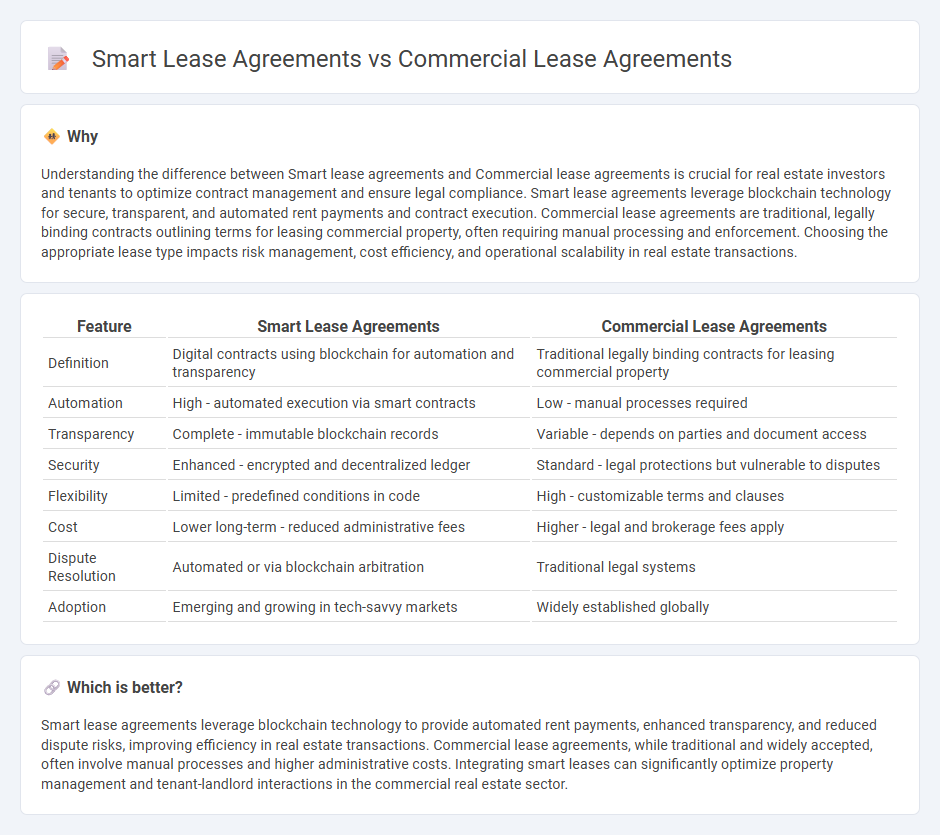
Smart lease agreements leverage blockchain technology and automation to enhance transparency, reduce disputes, and streamline rent payments in real estate transactions. Commercial lease agreements, typically traditional contracts, outline detailed terms between landlords and business tenants but often involve extensive paperwork and slower processing times. Explore the advantages of smart lease agreements compared to commercial lease contracts to optimize your leasing strategy.
Why it is important
Understanding the difference between Smart lease agreements and Commercial lease agreements is crucial for real estate investors and tenants to optimize contract management and ensure legal compliance. Smart lease agreements leverage blockchain technology for secure, transparent, and automated rent payments and contract execution. Commercial lease agreements are traditional, legally binding contracts outlining terms for leasing commercial property, often requiring manual processing and enforcement. Choosing the appropriate lease type impacts risk management, cost efficiency, and operational scalability in real estate transactions.
Comparison Table
| Feature | Smart Lease Agreements | Commercial Lease Agreements |
|---|---|---|
| Definition | Digital contracts using blockchain for automation and transparency | Traditional legally binding contracts for leasing commercial property |
| Automation | High - automated execution via smart contracts | Low - manual processes required |
| Transparency | Complete - immutable blockchain records | Variable - depends on parties and document access |
| Security | Enhanced - encrypted and decentralized ledger | Standard - legal protections but vulnerable to disputes |
| Flexibility | Limited - predefined conditions in code | High - customizable terms and clauses |
| Cost | Lower long-term - reduced administrative fees | Higher - legal and brokerage fees apply |
| Dispute Resolution | Automated or via blockchain arbitration | Traditional legal systems |
| Adoption | Emerging and growing in tech-savvy markets | Widely established globally |
Which is better?
Smart lease agreements leverage blockchain technology to provide automated rent payments, enhanced transparency, and reduced dispute risks, improving efficiency in real estate transactions. Commercial lease agreements, while traditional and widely accepted, often involve manual processes and higher administrative costs. Integrating smart leases can significantly optimize property management and tenant-landlord interactions in the commercial real estate sector.
Connection
Smart lease agreements leverage blockchain technology to automate and secure contract execution, enhancing transparency and reducing disputes in commercial lease agreements. Commercial lease agreements benefit from smart contracts by enabling real-time rent payments, automatic renewals, and precise enforcement of lease terms. Integrating smart lease agreements increases efficiency and trust between landlords and tenants within the commercial real estate market.
Key Terms
Traditional Contract
Traditional commercial lease agreements typically involve detailed paper contracts outlining responsibilities, rent terms, and duration, often requiring manual negotiation and amendments. These contracts can lead to prolonged administrative processes and increased risk of human error due to manual documentation and enforcement. Explore the advantages of evolving toward Smart lease agreements to streamline operations and enhance transparency.
Blockchain Technology
Commercial lease agreements traditionally rely on paper-based contracts that involve manual oversight, increasing the risk of errors and delayed payments. Smart lease agreements leverage blockchain technology to automate contract execution through self-executing smart contracts, ensuring transparency, security, and real-time tracking of lease terms and payments. Explore how integrating blockchain can revolutionize leasing practices by enhancing efficiency and trust in property management.
Automation
Smart lease agreements leverage automation technologies to streamline rent payments, maintenance requests, and lease renewals, reducing manual intervention typical in traditional commercial lease agreements. These automated processes enhance accuracy, speed, and transparency by integrating IoT devices, AI analytics, and blockchain for secure data management. Discover how automation transforms leasing efficiency and tenant experience in modern real estate management.
Source and External Links
Create Your Commercial Lease Agreement - A Commercial Lease Agreement defines landlord and tenant rights and obligations for non-residential property use, protecting parties by clearly establishing lease terms and responsibilities, essential for avoiding disputes and legal issues.
How to Structure a Commercial Property Lease Agreement - Key clauses like rent and payment terms, lease duration, use of premises, and renewal options are critical in a commercial lease to prevent legal conflicts and ensure clear understanding between landlord and tenant.
4 Types of Commercial Leases - Commercial leases come in gross, net, modified gross, and percentage leases, each affecting payment obligations and tenant responsibilities differently, which impacts business operations and financial planning.
 dowidth.com
dowidth.com